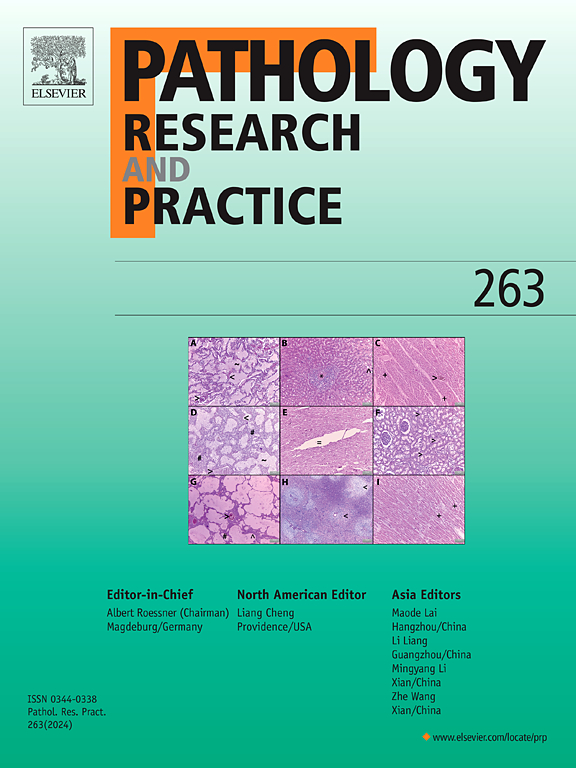Multiomics evaluation and machine learning optimize molecular classification, prediction of prognosis and immunotherapy response for ovarian cancer
IF 2.9
4区 医学
Q2 PATHOLOGY
引用次数: 0
Abstract
Background
Ovarian cancer (OC), owing to its substantial heterogeneity and high invasiveness, has historically been devoid of precise, individualized treatment options. This study aimed to establish integrated consensus subtypes of OC using different multiomics integration methodologies.
Methods
We integrated five distinct multiomics datasets from multicentric cohorts to identify high-resolution molecular subgroups using a combination of 10 and 101 clustering and machine learning algorithms, respectively, to develop a robust consensus multiomics-related machine learning signature (CMMS).
Results
Two cancer subtypes with prognostic significance were identified using multiomics clustering analysis. 10 essential genes were identified in the CMMS. Patients in the high CMMS group exhibited a poorer prognosis, with a “cold tumor” phenotype and an immunosuppressive state with reduced immune cell infiltration. In contrast, patients in the low CMMS group exhibited a more favorable prognosis, with immune activation and a “hot tumor" phenotype characterized by increased tumor mutation burden, tumor neoantigen burden, PD-L1 expression, and enriched M1 macrophages. Eight independent immunotherapy datasets were validated to further corroborate our findings regarding patients in the low CMMS group who responded better to immunotherapy.
Conclusions
CMMS detection has significant utility in the prognosis of patients at an early stage and identification of potential candidates for immunotherapy.
多组学评估和机器学习优化卵巢癌的分子分类、预测预后和免疫治疗反应
卵巢癌(OC)由于其异质性和高侵袭性,历来缺乏精确、个性化的治疗选择。本研究旨在使用不同的多组学整合方法建立完整的共识OC亚型。方法:我们整合了来自多中心队列的五个不同的多组学数据集,分别使用10和101聚类和机器学习算法的组合来识别高分辨率的分子亚群,以建立一个强大的共识多组学相关的机器学习签名(CMMS)。结果多组学聚类分析鉴定出2种具有预后意义的肿瘤亚型。在CMMS中鉴定出10个必需基因。高CMMS组患者预后较差,表现为“冷瘤”表型和免疫抑制状态,免疫细胞浸润减少。相比而言,低CMMS组患者表现出更有利的预后,免疫激活和“热瘤”表型,其特征是肿瘤突变负担增加、肿瘤新抗原负担增加、PD-L1表达增加、M1巨噬细胞富集。我们验证了8个独立的免疫治疗数据集,进一步证实了我们关于低CMMS组患者对免疫治疗反应更好的发现。结论scmms检测在早期诊断患者预后和鉴别潜在的免疫治疗候选物方面具有重要的应用价值。
本文章由计算机程序翻译,如有差异,请以英文原文为准。
求助全文
约1分钟内获得全文
求助全文
来源期刊
CiteScore
5.00
自引率
3.60%
发文量
405
审稿时长
24 days
期刊介绍:
Pathology, Research and Practice provides accessible coverage of the most recent developments across the entire field of pathology: Reviews focus on recent progress in pathology, while Comments look at interesting current problems and at hypotheses for future developments in pathology. Original Papers present novel findings on all aspects of general, anatomic and molecular pathology. Rapid Communications inform readers on preliminary findings that may be relevant for further studies and need to be communicated quickly. Teaching Cases look at new aspects or special diagnostic problems of diseases and at case reports relevant for the pathologist''s practice.

 求助内容:
求助内容: 应助结果提醒方式:
应助结果提醒方式:


